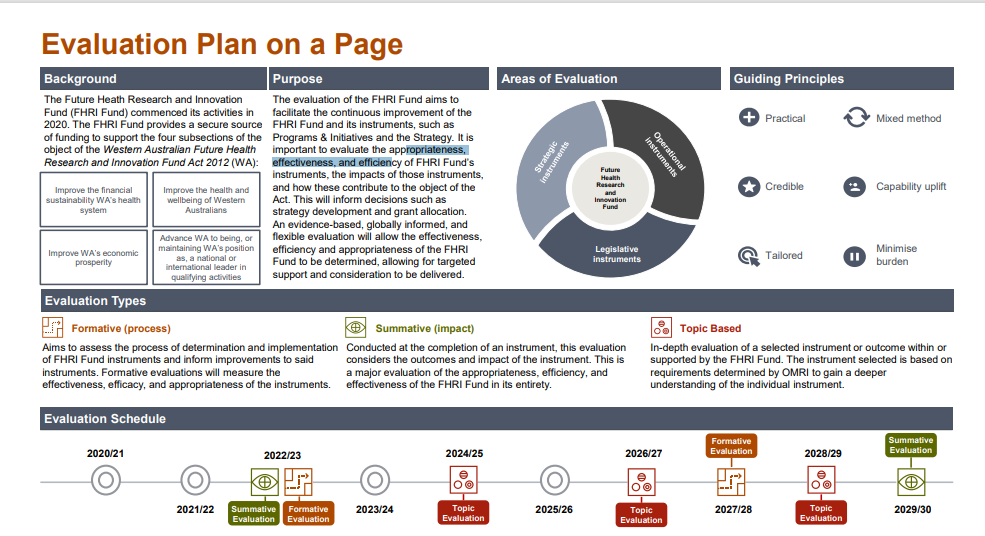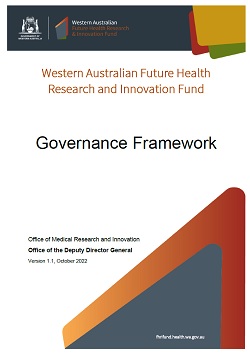FHRI Fund governance model
The governance model for the Future Health Research and Innovation (FHRI) Fund has several components.
The essential governance requirements are set out in the Act. Other governance provisions are outlined in the accompanying Governance Framework, while the Funding Principles guide the design, implementation and measurement of benefits from Programs and Initiatives. Policies and processes guide the day-to-day operation of the FHRI Fund.
The key governance-related provisions in the Act include the following:
- The Minister for Medical Research must establish and maintain an Advisory Council for the FHRI Fund.
- The Minister for Medical Research must seek recommendations from the Advisory Council on how money in the FHRI Account is applied and must consider the recommendations the Advisory Council provides.
- There will be a Governance Framework, which sets out the requirement for a Strategy and Priority Goals for funding.
- Transparency is assured by requiring that the Governance Framework, the Strategy and Priority Goals, recommendations sought and received by the Minister for Medical Research from the Advisory Council, and all funding awarded are tabled in Parliament and published on the FHRI Fund website.
- The Advisory Council must address conflicts of interest and include the steps to be taken if the member has any actual, perceived or potential material conflict of interests.
Further details are provided on the FHRI Fund Act page.
The Act requires the Minister for Medical Research to establish and maintain the Advisory Council, which will guide the application of investment income from the FHRI Fund. The Advisory Council is made up of eminent persons with experience in fields such as research, innovation, business, law, finance, corporate governance and the philanthropic, charitable and not-for-profit sectors. The Minister appoints the Advisory Council Chair for a 3-year term and members for a 2-year term and may reappoint a member to the Advisory Council. The members of the Advisory Council are described below.
- An expert in consumer and community health matters.
- A research expert and an innovation expert, with these positions intended to be filled from outside WA.
- Three members with experience in fields such as business, law, finance, corporate governance and the philanthropic, charitable and not-for-profit sectors.
- One of the members will be expert in regional health matters and one will be expert in Aboriginal health matters.
- The Minister for Health will appoint one of the above members as the Chair.
- There will be two non-voting State Government members, one of whom will be the Director General of the Department of Health, or nominee.
In order to provide additional links to national and international opportunities while also minimising perceived conflicts of interest, one of the two research and innovation experts will, on an alternating basis, not be based in WA. For example, if an innovation expert is based outside of WA, the next appointment would seek a member who is based in WA. The same would occur for the research expert. Biographies of Advisory Council members are available on the Advisory Council page.
Because of the high-level, strategic nature of the Advisory Council, Expert Committees will be formed as required to provide advice about contemporary issues and opportunities, to contribute specialist knowledge, or to assist with peer review processes to select funding recipients.
The Governance Framework supports the Act by providing details about process, policies and responsibilities that allow the FHRI Fund to operate responsibly, efficiently and transparently.
For example, the Governance Framework sets out the roles and responsibilities of the Minister for Medical Research and the Department of Health, describes how the Strategy and Priority Goals for the FHRI Fund will be developed and that evaluating the impact of the FHRI Fund will be done systematically, among other things.
The current version of the Governance Framework (v1.1, October 2022) can be downloaded below.
The FHRI Fund Funding Principles have been determined by the Advisory Council to guide the design and implementation of Programs and Initiatives, how funding applications are assessed and to ensure there is a focus on achieving and measuring the practical benefits the FHRI Fund is achieving. The 10 Funding Principles are presented below.
1. Open and Transparent
Ensure that the application and review processes are open and transparent, widely advertised and accessible to all relevant applicants to be able to identify the highest quality ideas and projects.
2. High-Quality
Implement a competitive and merit-based application and review process, ensuring that the best quality applications are funded, and that funding is only awarded if high-quality proposals are received.
3. Independent Review
Implement independent expert peer review to secure the integrity of the review and assessment process.
4. Partnerships and Collaboration
Give priority to proposals that demonstrate partnerships (whether formal or informal) and working collaboratively with others to maximise impact, including incentivising co-investment from the academic, research, government, private and philanthropic sectors.
5. Consumers and the Community
Ensure that consumers and the community are involved at every stage of Program and Initiative design and implementation, and the funded research and innovation activities.
6. Build Culture
Strengthen the research and innovation culture in WA by investing in researchers and innovators to achieve their career aspirations, who can in turn create an environment, through mentorship and collaboration, which supports continued success.
7. Accelerate and Translate
Achieve impact through accelerating the development of innovative ideas into products or services with commercial and/or implementation potential; and enabling the translation of research into practice and policy.
8. Sustainable Long Term Change
Amplify the impact of the FHRI Fund funding by considering sustainability of the supported proposals post the grant period. Take a system change approach to addressing persistent social, economic and behavioural issues affecting health outcomes, acknowledging that long-term change requires a collaborative approach beyond an individual researcher or project.
9. Review and Evaluate
Evaluate the return on investment for all funded programs on a regular basis to maximise the benefits of the FHRI Fund and demonstrate these to stakeholders.
10. Equitable Outcomes
Support equitable outcomes by considering the structures of bias, disadvantage and inequity in Australian society stemming from dimensions such as Aboriginal or Torres Strait Islander status, gender identity, career stage, race, ethnicity, language, religion and disability or a combination of all or any of these. Ensure that strategies to promote equity are considered, and incorporated where appropriate, into the design and implementation of funding programs.
The FHRI Fund commenced in June 2020 and provides a secure source of funding to improve, through research and innovation, the health and prosperity of Western Australians, the sustainability of the health system and to advance the State’s standing as a leader in research and innovation.
Independent consultants PwC were engaged to develop an Evaluation Plan for the FHRI Fund.
The Evaluation Plan spans 10 years from the operational commencement of the FHRI Fund in 2019-20 through to 2029-30. The Evaluation Plan is designed, but not limited, to evaluate the FHRI Fund instruments.
FHRI Fund operational instruments include the FHRI Fund governance model, grants, policies and procedures and the strategic instruments include the FHRI Fund Strategy, Priority Goals, Programs and Initiatives, which are developed by the Advisory Council and/or the Office of Medical Research and Innovation.
Evaluations will provide insights as to the appropriateness, efficiency, and effectiveness of the FHRI Fund (formative evaluation) and insights to the outcomes and impacts of the FHRI Fund (summative evaluation). These evaluation insights will enable improvement within the activities supported by the FHRI Fund.
See the Evaluation Plan on a Page below.
 |


